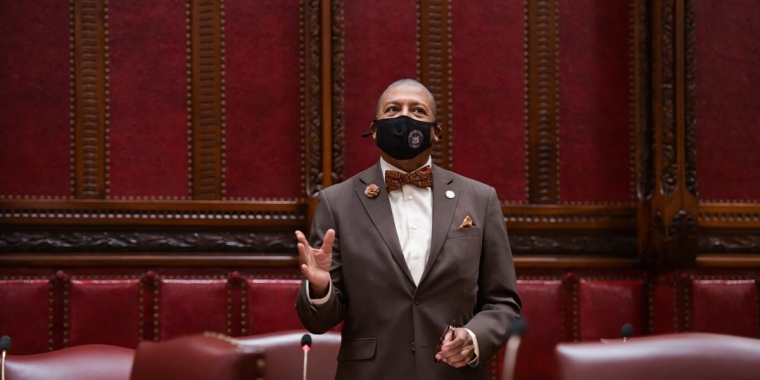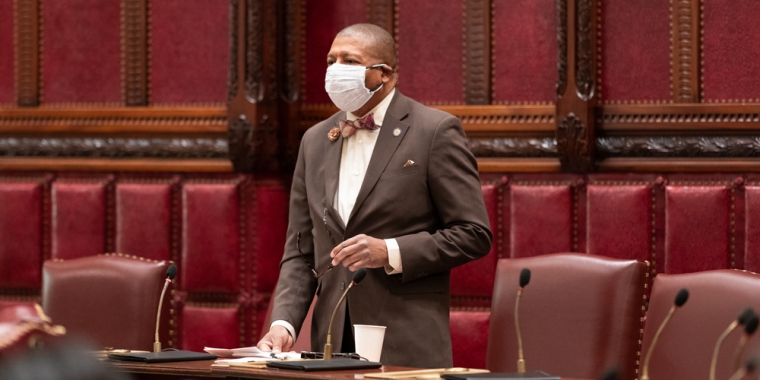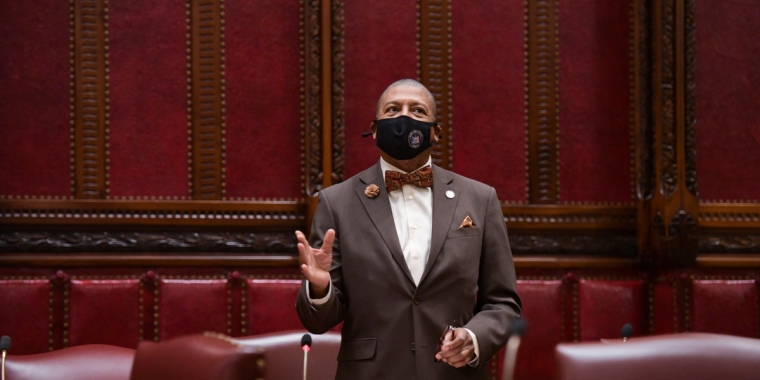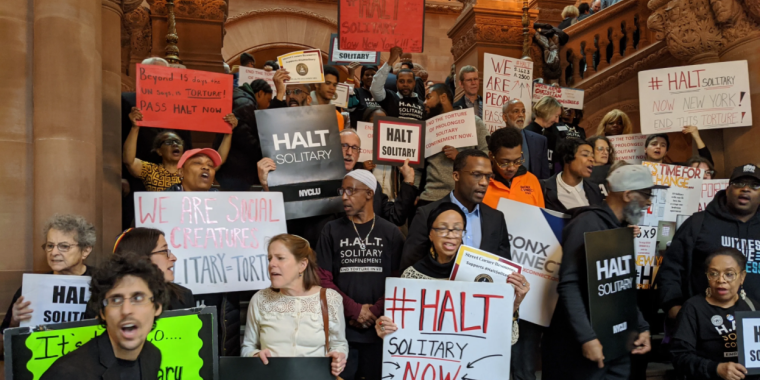
Sanders Hosts Albany Caucus Bus Trip; Delivers State of the District Address
February 16, 2016
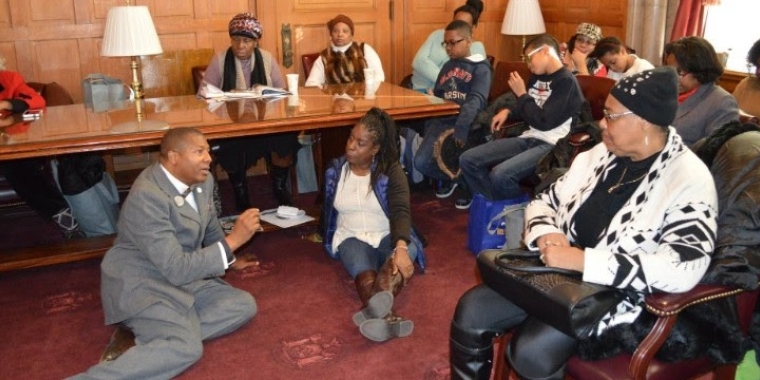
State Senator James Sanders Jr. (D-Rochdale Village) hosted a free bus trip to Albany for his constituents on February 13, 2016 so they could join him during the 45th Annual Legislative Conference of the New York State Association of Black and Puerto Rican Legislators. Some 150 people from the community participated and were Sanders' guests at his State of the District address. He also co-sponsored two panel discussions, one on Minority and Women-Owned Business Enterprises and the other on workers’ compensation.
“I am glad that you took the trip down here,” Sanders told attendees. “I am so glad to see so many friends that I know, and so glad to see so many friends that I’m getting to know. I’m blessed. That word has meaning. It means empowered to succeed. That doesn’t mean I won’t have problems. That doesn’t mean enemies won’t form against me. It just means they won’t prosper. It won’t work. So that’s why you won’t see me sweating the small stuff. You won’t see me someplace crying. I’m too busy building. I like building.”
“I am doing what I’m doing because I believe in it,” Sanders continued. “This is not a job for me. A job, from my point of view, is when you have some ugly people, mean people, and you have to slave hard for them. That’s a job. This is a labor of love. I serve the best folk around.”
During his State of the District address, Sanders reaffirmed that a key priority moving forward would be economic development. He stressed the importance of home and business ownership as a way to combat gentrification, which he said is taking over many parts of the city and perpetuating an unequal distribution of wealth. He expressed concern that these sections may soon include Jamaica and Far Rockaway. He noted that Jamaica is experiencing some growth, with the construction of new hotels and other businesses, and the ability of the Airtrain to make movement to and from the area more accessible. Far Rockaway, he said, is slated to have ferry service that can transport people to Manhattan in 30 minutes.
“We are at a moment of great change in our district,” Sanders said. "New York City is becoming heavily gentrified. We are in a city where it’s impossible to live. Who could afford to pay these prices, and it’s getting worse, not better. Our district will be faced with this crisis.”
Sanders said residents must begin planning now for these changes now and that he will be offering major training sessions on how to buy a home and/or business, including how to cope with the major financial responsibilities that come along with both. Also, as a member of the Senate Banking Committee, Sanders will be fighting to ensure that the Community Reinvestment Act is enforced. It is a federal law that encourages banks to lend money to residents in the communities in which they are located.
"America should be America for everybody, and we should have a chance to own a piece of America,” Sanders said. “That’s the goal. That’s where we are headed.”
In line with financial investment and economic recovery, Sanders spoke of the tremendous efforts to rebuild after Hurricane Sandy, particularly in the Rockaways. He recalled the disorganized state of the community immediately after the storm and said more must be done to plan for future emergencies and weather-related disasters. Sanders cited the importance of caring for vulnerable populations during these times, particularly the elderly and disabled.
“When the storm hit, it was every man for himself and God help us all,” Sanders said. “We need to start planning as a community again for the next storm.”
Sanders has already co-hosted several Citizen Preparedness Corps training programs, which teach residents how to respond quickly and accordingly to any type of disaster. Participants are also given an emergency "to go" bag, containing items such as a pocket radio, duct tape, first aid kit, flashlight, batteries, a respirator, a plastic drop cloth, emergency purified drinking water, safety goggles, and a survival food pack.
Also on Sanders list of priorities is using creative methods of teaching young people how to invest in their financial future and grow wealth. One such way is through the Stock Market Game, a national contest where students are put into groups with imaginary money and are taught how to invest in stocks and bonds. It gives them the opportunity to use their educational skills in math, English, economics and social studies and apply them to real life situations with the goal of helping them develop positive money habits that will prepare them for the future.
In addition to the State of the District address, Sanders, the father of MWBEs, having authored Local Law 129 and Local Law 1, a type of affirmative action, during his time as a City Council Member, co-sponsored a panel discussion on Minority and Women-Owned Business Enterprises to discuss ways economic opportunities could be created and communities could become engaged in the development of the city and state.
“I must admit that I am saddened that we have not made more progress,” Sanders said. “This is not what we envisioned when we started out. I am looking forward to finding ways of correcting that. I’m looking forward to finding ways to get on track and make things happen, realizing that at the end of the day people need jobs and work and that the city and state belongs to all of us, therefore all of us should have a part in it.”
Sanders recently introduced legislation (S.6467) that if passed, would require local governments to meet the statewide MWBE goal when awarding contracts funded by state dollars. That figure is currently close to 30 percent, the highest in the nation.
During the caucus weekend, Sanders, the ranker on the senate’s Civil Service and Pensions Committee, also co-sponsored a panel discussion on workers’ compensation with Assembly Member Francisco Moya. The goal of the panel discussion was to examine the pattern of what some consider detrimental changes to workers’ compensation law and to strengthen the safety net of workers injured on the job.
The premise of workers’ compensation is relatively simple. If a worker gets injured on the job, they are supposed to receive wage replacement and medical care in exchange for giving up the right to sue their employer. However, several panelists, which included union representatives, voiced concerns about the impact the 2016 Executive Budget Proposal would have on injured workers and the state’s Workers’ Compensation System.
Joseph W. Canovas, special counsel with the New York State American Federation of Labor and Congress of Industrial Organizations (AFL-CIO) stated that the budget proposal reduces benefits for injured workers, decreases oversight, due process, transparency and accountability at the Workers’ Compensation Board and provides an unprecedented level of discretion in case handling and decision making for their top level staff. It also affects insurance and changes the way some deposits and reserves are made to socialize risk. It creates the possibility that when an insolvent insurance company defaults on its workers’ compensation obligations, good, responsible employers are charged with an increase to their premium to make up for the shortfalls of those irresponsible carriers.
According to the Bureau of Labor Statistics, nearly 3 million occupational injuries and illnesses occur each year and approximately 4,500 workers are killed on the job annually.
“One of the great issues that we deal with in Albany, and in the world, is what to do with workers if they are injured," Sanders said. “Sadly, as much as we try, there will always be workers that sustain some type of injury. We all want to deal fairly with these workers, but we all have different definitions of what is fair or appropriate.”
In addition to participating in panel discussions, the constituents who took part in the Albany trip enjoyed a complimentary lunch and had the chance to admire the architectural design of the Capital and Legislative Office Building as well as learn about their history. They were also able to walk the concourse and interact with the many vendors and advocates who were stationed there during the caucus.
We would like to thank our Albany trip sponsors AARP and BJs.
Share this Article or Press Release
Newsroom
Go to Newsroom